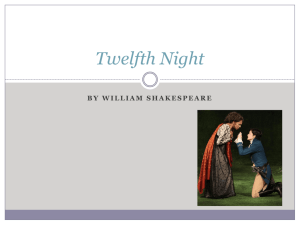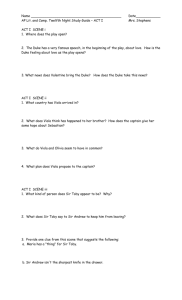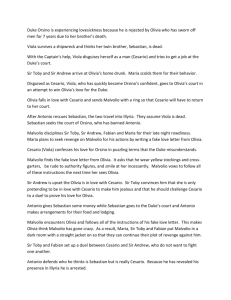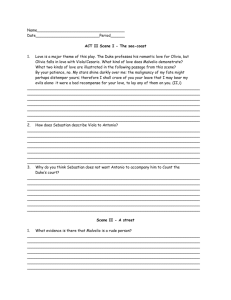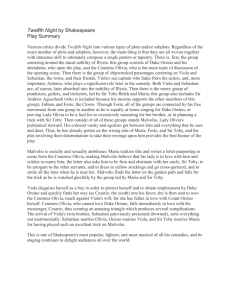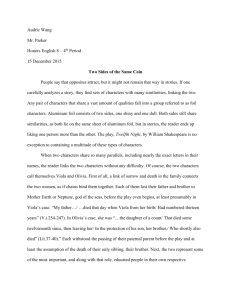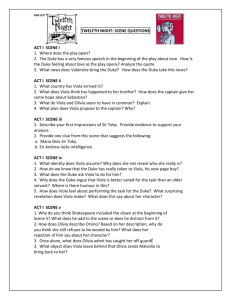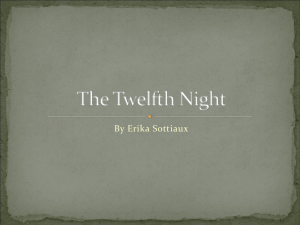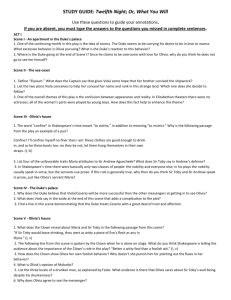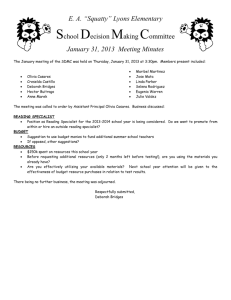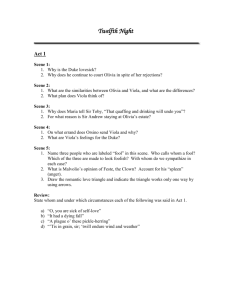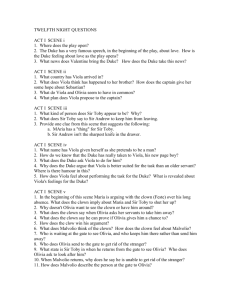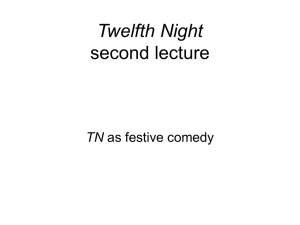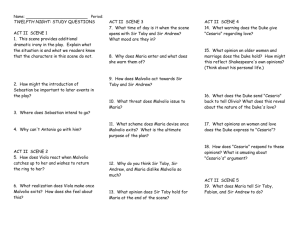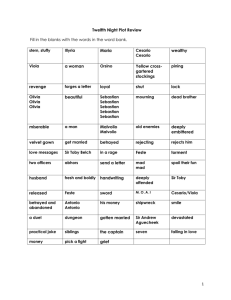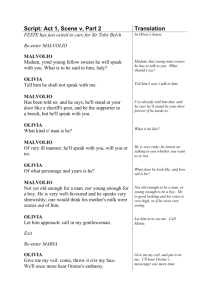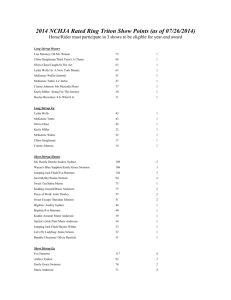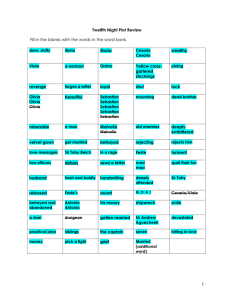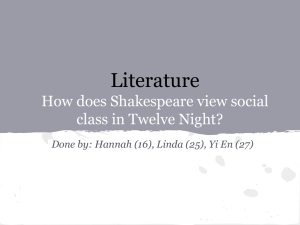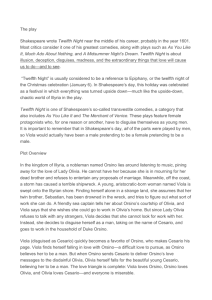Act-I-Study-Guide
advertisement
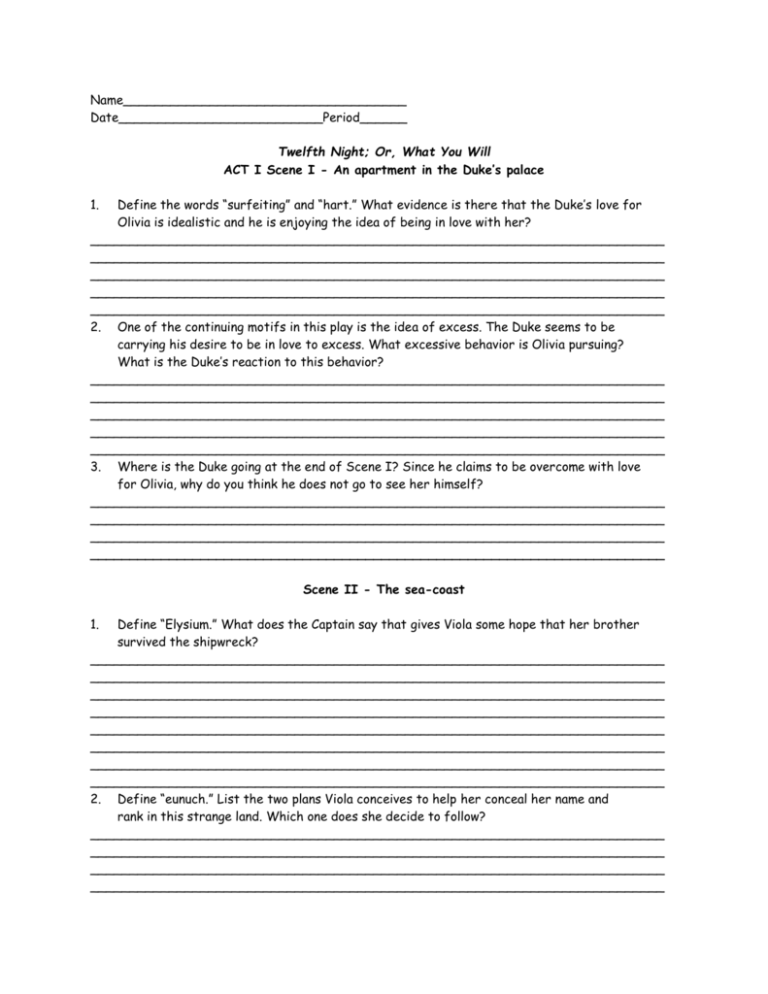
Name____________________________________ Date__________________________Period______ Twelfth Night; Or, What You Will ACT I Scene I - An apartment in the Duke’s palace 1. Define the words “surfeiting” and “hart.” What evidence is there that the Duke’s love for Olivia is idealistic and he is enjoying the idea of being in love with her? _________________________________________________________________________ _________________________________________________________________________ _________________________________________________________________________ _________________________________________________________________________ _________________________________________________________________________ 2. One of the continuing motifs in this play is the idea of excess. The Duke seems to be carrying his desire to be in love to excess. What excessive behavior is Olivia pursuing? What is the Duke’s reaction to this behavior? _________________________________________________________________________ _________________________________________________________________________ _________________________________________________________________________ _________________________________________________________________________ _________________________________________________________________________ 3. Where is the Duke going at the end of Scene I? Since he claims to be overcome with love for Olivia, why do you think he does not go to see her himself? _________________________________________________________________________ _________________________________________________________________________ _________________________________________________________________________ _________________________________________________________________________ Scene II - The sea-coast 1. Define “Elysium.” What does the Captain say that gives Viola some hope that her brother survived the shipwreck? _________________________________________________________________________ _________________________________________________________________________ _________________________________________________________________________ _________________________________________________________________________ _________________________________________________________________________ _________________________________________________________________________ _________________________________________________________________________ _________________________________________________________________________ 2. Define “eunuch.” List the two plans Viola conceives to help her conceal her name and rank in this strange land. Which one does she decide to follow? _________________________________________________________________________ _________________________________________________________________________ _________________________________________________________________________ _________________________________________________________________________ _________________________________________________________________________ _________________________________________________________________________ _________________________________________________________________________ _________________________________________________________________________ 3. One of the overall themes of this play is the confusion between appearance and reality. In Elizabethan theaters there were no actresses; all of the women’s parts were played by young boys. How does this fact help to enhance this theme? _________________________________________________________________________ _________________________________________________________________________ _________________________________________________________________________ _________________________________________________________________________ _________________________________________________________________________ _________________________________________________________________________ _________________________________________________________________________ _________________________________________________________________________ Scene III - Olivia’s house 1. The word “confine” in Shakespeare’s time meant “to clothe,” in addition to meaning “to restrict.” Why is the following passage from the play an example of a pun? Confine? I’ll confine myself no finer than I am: these clothes are good enough to drink in; and so be these boots too:-an they be not, let them hang themselves in their own straps. (I, iii) _________________________________________________________________________ _________________________________________________________________________ _________________________________________________________________________ _________________________________________________________________________ _________________________________________________________________________ _________________________________________________________________________ _________________________________________________________________________ _________________________________________________________________________ _________________________________________________________________________ 2. List four of the unfavorable traits Maria attributes to Sir Andrew Aguecheek? What does Sir Toby say in Andrew’s defense? _________________________________________________________________________ _________________________________________________________________________ _________________________________________________________________________ _________________________________________________________________________ _________________________________________________________________________ _________________________________________________________________________ _________________________________________________________________________ _________________________________________________________________________ _________________________________________________________________________ 3. Discuss the relationship between Sir Toby and Sir Andrew. Why does Sir Toby want Sir Andrew to remain a guest in Olivia’s house? _________________________________________________________________________ _________________________________________________________________________ _________________________________________________________________________ _________________________________________________________________________ _________________________________________________________________________ _________________________________________________________________________ _________________________________________________________________________ _________________________________________________________________________ _________________________________________________________________________ _________________________________________________________________________ 4. In Shakespeare’s time there were basically only two classes of people: the nobility and everyone else; in his plays the nobility usually speak in verse, but the servants use prose. If this rule is generally true, why then do you think Sir Toby and Sir Andrew speak in prose, just like Olivia’s servant Maria? _________________________________________________________________________ _________________________________________________________________________ _________________________________________________________________________ _________________________________________________________________________ _________________________________________________________________________ _________________________________________________________________________ _________________________________________________________________________ _________________________________________________________________________ _________________________________________________________________________ _________________________________________________________________________ Scene IV - The Duke’s palace 1. Why does the Duke believe that Viola/Cesario will be more successful than the other messengers at getting in to see Olivia? _________________________________________________________________________ _________________________________________________________________________ _________________________________________________________________________ _________________________________________________________________________ _________________________________________________________________________ _________________________________________________________________________ _________________________________________________________________________ _________________________________________________________________________ 2. What does Viola say in the aside at the end of this scene that adds a complication to the plot? _________________________________________________________________________ _________________________________________________________________________ _________________________________________________________________________ _________________________________________________________________________ _________________________________________________________________________ _________________________________________________________________________ _________________________________________________________________________ _________________________________________________________________________ 3. Find a line in this scene demonstrating that the Duke treats Cesario with a great deal of trust and affection. _________________________________________________________________________ _________________________________________________________________________ _________________________________________________________________________ _________________________________________________________________________ _________________________________________________________________________ _________________________________________________________________________ _________________________________________________________________________ _________________________________________________________________________ Scene V - Olivia’s house 1. What does the Clown reveal about Maria and Sir Toby in the following passage from this scene? “If Sir Toby would leave drinking, thou wert as witty a piece of Eve’s flesh as any in Illyria.” (I, v) _________________________________________________________________________ _________________________________________________________________________ _________________________________________________________________________ _________________________________________________________________________ _________________________________________________________________________ _________________________________________________________________________ 2. The following line from this scene is spoken by the Clown when he is alone on stage. What do you think Shakespeare is telling the audience about the importance of the Clown’s role in the play? “Better a witty fool than a foolish wit.” (I, v) _________________________________________________________________________ _________________________________________________________________________ _________________________________________________________________________ _________________________________________________________________________ _________________________________________________________________________ _________________________________________________________________________ 3. How does the Clown show Olivia her own foolish behavior? Why doesn’t she punish him for pointing out the flaws in her behavior? _________________________________________________________________________ _________________________________________________________________________ _________________________________________________________________________ _________________________________________________________________________ _________________________________________________________________________ _________________________________________________________________________ 4. What is Olivia’s opinion of Malvolio? _________________________________________________________________________ _________________________________________________________________________ _________________________________________________________________________ _________________________________________________________________________ _________________________________________________________________________ _________________________________________________________________________ 5. List the three levels of a drunken man, as explained by Feste. What evidence is there that Olivia cares about Sir Toby’s well-being despite his drunkenness? _________________________________________________________________________ _________________________________________________________________________ _________________________________________________________________________ _________________________________________________________________________ _________________________________________________________________________ _________________________________________________________________________ 6. Why does Olivia agree to see the messenger? _________________________________________________________________________ _________________________________________________________________________ _________________________________________________________________________ _________________________________________________________________________ _________________________________________________________________________ _________________________________________________________________________ 7. What concessions does Viola/Cesario manage to get from Olivia before delivering Orsino’s message? _________________________________________________________________________ _________________________________________________________________________ _________________________________________________________________________ _________________________________________________________________________ _________________________________________________________________________ 8. In what way can the following line from this scene be interpreted as both a compliment and an insult? What other insult does Viola/Cesario give to Olivia in this scene? Excellently done, if God did all. (I,v) _________________________________________________________________________ _________________________________________________________________________ _________________________________________________________________________ _________________________________________________________________________ _________________________________________________________________________ 9. List the ways Viola/Cesario would try to win Olivia’s heart if he/she were the Duke. _________________________________________________________________________ _________________________________________________________________________ _________________________________________________________________________ _________________________________________________________________________ _________________________________________________________________________ 10. What evidence is there that Olivia likes Viola? How does she make sure that she will see the messenger again? _________________________________________________________________________ _________________________________________________________________________ _________________________________________________________________________ _________________________________________________________________________ _________________________________________________________________________ 11. At the end of this scene why do you think Olivia is willing to turn her life over to fate? I do I know not what, and fear to find Mine eye too great a flatterer for my mind. Fate, show thy force: ourselves we do not owe; What is decreed must be, and be this so. (I, v) _________________________________________________________________________ _________________________________________________________________________ _________________________________________________________________________ _________________________________________________________________________ _________________________________________________________________________ 12. Why do you think Olivia speaks in both prose and verse in this scene? _________________________________________________________________________ _________________________________________________________________________ _________________________________________________________________________ _________________________________________________________________________ _________________________________________________________________________ 13. Identify the speaker of each of the following quotes from Act I a. “If music be the food of love, play on;” ______________________________________________________________________ b. “Thou shalt present me as an eunuch to him,” ______________________________________________________________________ c. “You mistake, knight; ‘accost’ is front her, board her, woo her, assail her.” ______________________________________________________________________ d. “Be clamorous and leap all civil bounds,” ______________________________________________________________________ e. “Whoe’er I woo, myself would be his wife.” ______________________________________________________________________ f. “By my troth, Sir Toby, you must come in earlier o’ nights: your cousin, my lady, takes great exceptions to your ill hours.” ______________________________________________________________________ g. “Better a witty fool than a foolish wit.” ______________________________________________________________________ h. “He is very well-favoured, and he speaks very shrewishly; one would think his mother’s milk were scarce out of him.” ______________________________________________________________________ i. “Excellently done, if God did all.” ______________________________________________________________________ j. “If that the youth will come this way tomorrow, I’ll give him reasons for ‘t: hie thee, Malvolio.” ______________________________________________________________________
